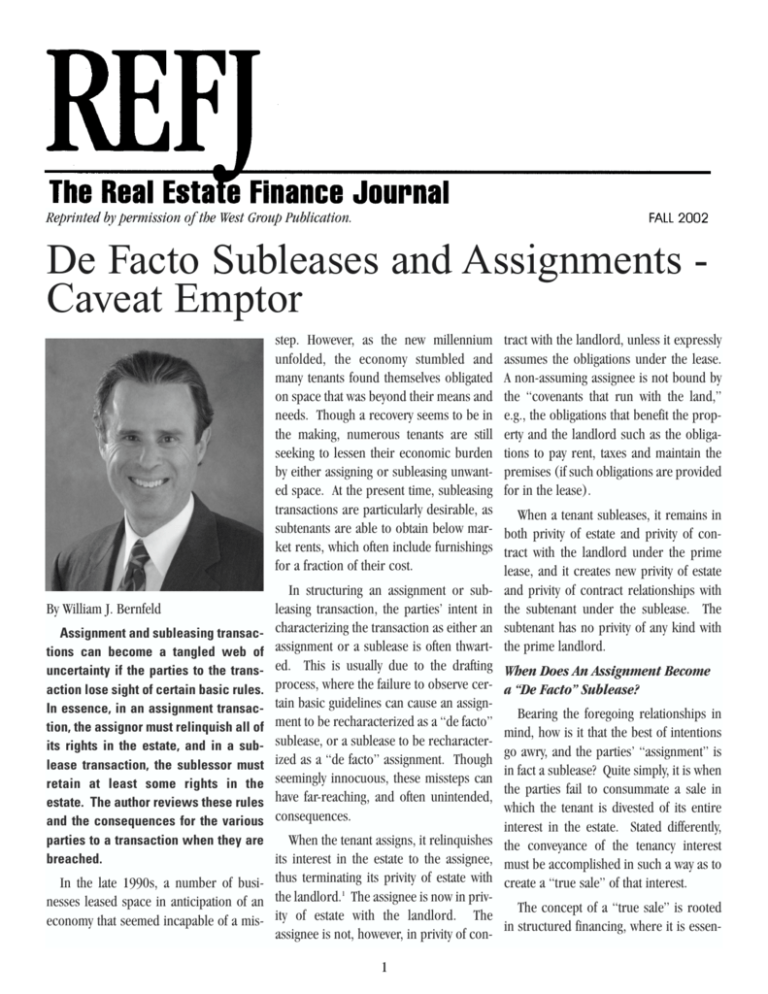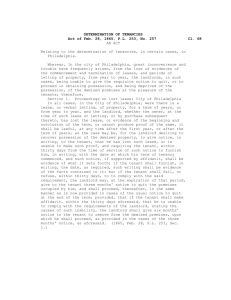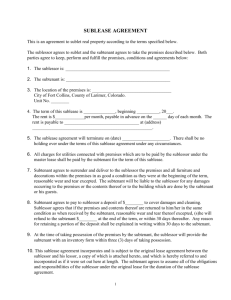De Facto Subleases and Assignments
advertisement

Reprinted by permission of the West Group Publication. De Facto Subleases and Assignments Caveat Emptor step. However, as the new millennium unfolded, the economy stumbled and many tenants found themselves obligated on space that was beyond their means and needs. Though a recovery seems to be in the making, numerous tenants are still seeking to lessen their economic burden by either assigning or subleasing unwanted space. At the present time, subleasing transactions are particularly desirable, as subtenants are able to obtain below market rents, which often include furnishings for a fraction of their cost. By William J. Bernfeld In structuring an assignment or subleasing transaction, the parties’ intent in characterizing the transaction as either an assignment or a sublease is often thwarted. This is usually due to the drafting process, where the failure to observe certain basic guidelines can cause an assignment to be recharacterized as a “de facto” sublease, or a sublease to be recharacterized as a “de facto” assignment. Though seemingly innocuous, these missteps can have far-reaching, and often unintended, consequences. Assignment and subleasing transactions can become a tangled web of uncertainty if the parties to the transaction lose sight of certain basic rules. In essence, in an assignment transaction, the assignor must relinquish all of its rights in the estate, and in a sublease transaction, the sublessor must retain at least some rights in the estate. The author reviews these rules and the consequences for the various parties to a transaction when they are When the tenant assigns, it relinquishes breached. its interest in the estate to the assignee, tract with the landlord, unless it expressly assumes the obligations under the lease. A non-assuming assignee is not bound by the “covenants that run with the land,” e.g., the obligations that benefit the property and the landlord such as the obligations to pay rent, taxes and maintain the premises (if such obligations are provided for in the lease). When a tenant subleases, it remains in both privity of estate and privity of contract with the landlord under the prime lease, and it creates new privity of estate and privity of contract relationships with the subtenant under the sublease. The subtenant has no privity of any kind with the prime landlord. When Does An Assignment Become a “De Facto” Sublease? Bearing the foregoing relationships in mind, how is it that the best of intentions go awry, and the parties’ “assignment” is in fact a sublease? Quite simply, it is when the parties fail to consummate a sale in which the tenant is divested of its entire interest in the estate. Stated differently, the conveyance of the tenancy interest must be accomplished in such a way as to In the late 1990s, a number of busi- thus terminating its privity of estate with create a “true sale” of that interest. 1 nesses leased space in anticipation of an the landlord. The assignee is now in privThe concept of a “true sale” is rooted economy that seemed incapable of a mis- ity of estate with the landlord. The in structured financing, where it is essenassignee is not, however, in privity of con1 tial that the purchaser of a pool of loans acquire all the incidences of ownership, including the risks along with the rewards. If, for instance, the purchaser retains a right of recourse against the seller if the loans are not paid, the seller hasn’t really parted with title (it has retained the risks), and the transaction is nothing more than a loan (and hopefully, a secured loan). This is a circumstance that chills the spines of the rating agencies, who have graded the paper based upon the assumption that the consequences flowing from the bankruptcy of the transferor would not be a significant risk factor. Just as in the structured financing arena, the assignor must part with its entire interest in order to pass title in the tenancy estate to an assignee. degree of control over the relinquished property in the event of a default under the note - i.e., it will want the ability to step back into the premises and run the business after a foreclosure of the assets. Thus, the seller will qualify its assignment to provide that in the event of a default, the seller has a right of re-entry. Even apart from the sale of a business, though, an assignor may cleverly attempt to retain a right of re-entry, so that in the event of a default, the assignor can control the reletting process and minimize its exposure, rather than first learning of the default when the landlord files suit. If a tenant wants to stay in the loop, the cleanest approach is to enter into a sublease. Yes, the tenant will still be obligated to pay rent and will remain as the liaison with the landlord on day-to-day matters. A tenant who wishes to assign, and “rid” itself of ongoing issues relating to the management of the premises, must however, accept its fate - i.e., that so long as the lease obligation remains outstanding, it will remain secondarily liable. The only way for an assignor to minimize the risk is to undertake the same due diligence efforts and credit analysis that are performed by a landlord entering into a leasing transaction. As well meaning as this right of re-entry may be, the bottom line is that it prevents Consequences Of Entering the assignor from divesting itself of the Into An Assignment That Is entire interest in the estate, and a sublease A De Facto Sublease The best way to describe the manner in relationship is created. So what does it mean if an assignment which a “true sale” of the tenancy interest is There is a method by which the assign- is recharacterized as a sublease? Here are achieved is by stating what is not a “true or can protect itself, however, where the some examples of its impact, broken sale,” and what does not qualify as an assignleasehold estate is an integral part of the down by the various parties to the transment. Set forth below are several examples: sale of a business that is financed in whole action. With respect to the original tenant: • The tenant transfers less than the or in part by the seller. The seller can • Privity of estate with the landlord is entire premises for the full remaining assign the lease to the buyer, and then not terminated. Thus, if the property term of the lease; record a deed of trust against the tenancy suffers an uninsured loss, and the • The tenant transfers the entire prem- interest in the leasehold. The deed of trust ises for a period less than the full would secure the purchaser’s repayment obligation under the promissory note. term of the original lease; • The tenant imposes terms and condi- This approach is typically difficult to tions on the transferee that are dif- accomplish, however, since the tenant has ferent than those contained in the no interest of record in the premises, and a memorandum of lease must therefore master lease; or be recorded. Most landlords resist such • The tenant retains a right of reversion an approach because they typically do not or a right of re-entry. want title clouded in perpetuity by interWhat do all of these examples have in ests of tenants in the property.2 common? The “assignor” has failed to The foregoing complications all stem make a clean break and part with its from the assignor’s conflicting desires. entire interest. On the one hand, the assignor wishes to Perhaps the most frequent instance in rid itself of the obligations associated with which an assignment becomes recharac- remaining in privity of estate with the terized as a sublease is in the context of landlord. Yet, on the other hand, it desires the sale of a business. Where the seller to protect itself in the event of a default by carries back a note from the buyer, the the assignee. seller will often wish to retain some 2 lease obligates the original tenant to maintain the improvements, the original tenant could still be primarily liable for restoring the premises along with the “assignee.” • If someone is injured on the premises, because the original tenant still has an interest in the estate, the original tenant still could be liable. • The original tenant may not have any suretyship defenses in the event of a claim by the landlord for unpaid rent or breach of lease.3 With respect to the assignee: • The “assignee” will not be able to exercise any options under the master lease, having no privity of contract with the master landlord. Thus, if the “assignee’s” exercise of the option becomes time barred, the original tenant may have liability to the “assignee” (the same as a sublandlord may have to a subtenant for failing to keep the master lease in full force and effect). • The bankruptcy of the tenant, and the rejection of the master lease and the sublease, could leave the “assignee” with few remedies. If it were properly drafted as an assignment, the bankruptcy of the assignor would have little impact, since the assignor would no longer be in privity of estate with anyone.4 • The bankruptcy of the landlord and the rejection of the master lease may not entitle the “assignee” (in reality a subtenant) to remain in possession of the premises pursuant to Section 365(h)(1)(A) of the Bankruptcy Code. • The “assignee,” having no privity of contract with the landlord, would not have standing to compel the landlord to abide by its obligations under the master lease (such as paying taxes and insurance, maintaining the building and providing HVAC, assuming that the master lease places these obligations upon the landlord). With respect to the master landlord: • The master landlord has lost another potential source of recovery - had the “assignee” assumed the lease, the landlord and assignee would have been in privity of contract, and the master landlord could then pursue the assignee for non-payment of rent. • The master landlord will need to name the original tenant in any unlawful detainer proceeding, since the original tenant still has privity of estate with the landlord, and has not relinquished its interest in the estate. • If the master landlord wants to buy out a below market lease to accommodate another tenant, it will not have clear title if the “assignee” alone (and not the original tenant) signs the termination document. The landlord would have to buy out its original tenant (in addition to the “subtenant”) in order to terminate the privity of estate. When Does A Sublease Become A “De Facto” Assignment? As noted, an “assignment” will become a sublease where the “assignor” fails to relinquish all of its interest in the estate. Conversely, a sublease will be construed as an assignment when the sublessor fails to retain some interest in the leasehold estate. In other words, though the document is called a sublease, if it in fact accomplishes a sale of the sublessor’s entire interest in the premises, then it is a de facto assignment. Most standard forms of sublease recite that the terms and conditions of the sublease are the same as the master lease, and that the words “landlord” under the master lease means “sublandlord” under the sublease, and similarly, “tenant” under the master lease means “subtenant” under the sublease. Though the standard form contains a blank in which the parties are to fill in references to the master lease which are not incorporated into the sublease, many times the inserted provisions are not of adequate consequence so as to prevent the sublandlord from relinquishing all of its interest in the estate. (For example, many times the sublease will merely carve out obligations of a tenant under a work letter, which have already been performed, or assignment and subletting provisions which are perhaps more restrictive than the master lease.) Though the circumstances of each attempt to characterize a sublease as an assignment will vary, the key to assuring that the ten3 ant has not relinquished its entire interest in the estate is to limit the sublease term to a shorter period than that of the master lease, even if by only one day. Consequences Of Entering Into A Sublease That Is A De Facto Assignment So what does it mean if a sublease is recharacterized as an assignment? Here are some examples of its impact, again broken down by the various parties to the transaction. With respect to the original tenant: • Rights given to the original tenant may not be retained and will be owned by the “subtenant,” provided they are not personal to the original tenant (i.e., an option to purchase or a right of first refusal to purchase). • Any “profit” that the original tenant retained from a subleasing transaction will become the property of the landlord, and will become payable to the landlord, who is not in privity of estate with the “subtenant.” • The original tenant has not retained a right of re-entry, which has a potentially deleterious impact, where the original tenant has carried back a note with an eye to stepping back into the business in the event of a default. • Renewal options are transferred to the “subtenant,” and the original tenant will remain secondarily liable if the transferee exercises any extension options. With respect to the subtenant: • Where the transferee has “assumed” all of tenant’s obligations under the master lease (as is typical in the standard form of sublease), and the sublease transaction is collapsed because the sublessor has failed to retain any interest in the estate, the landlord will argue that there is privity of contract with the “subtenant,” and therefore, the “subtenant” will have liability directly to the landlord for breach of lease covenants. transaction, the assignor must relinquish all of its rights in the estate, and in a sublease transaction, the sublessor must retain at least some rights in the estate. • The “subtenant” could be liable to the Thus, if the parties take their eyes off the landlord for the full rent under the estate, they risk a collision - and the liamaster lease, as opposed to any less- bility and damages might only be deterer rate charged under the sublease.5 mined by expensive lawyers in protracted litigation. With respect to the master landlord: ____________________________ • A “subtenant” could argue that it is in William J. Bernfeld, an attorney privity of contract with the landlord, in the Los Angeles office of and thus able to compel the landlord Kirkpatrick & Lockhart LLP, is a busito perform or abide by certain proviness lawyer, practicing in the areas sions of the master lease. In the conof real estate, commercial finance text of a shopping center lease, for and creditor’s rights. He may be example, the subtenant may attempt reached at wbernfeld@kl.com. The to enforce an “exclusivity” provision author would like to thank Nicole M. in the master lease, thereby preventLee, an associate at Kirkpatrick & ing the landlord from leasing to Lockhart LLP, who assisted in peranother tenant with a competing use. forming the research for this article. Under a true sublease, since there is 1 “Privity of estate” means that the parno privity of contract with the master landlord, a subtenant would have no ties have a relationship by virtue of their independent standing to raise such an landlord/tenancy interests in the property. “Privity of contract” means the parties argument. have a relationship by virtue of their obliConclusion gations to one another under the lease Assignment and subleasing transactions contract. can become a tangled web of uncertainty 2 These interests, for example, could be if the parties to the transaction lose sight a hindrance in connection with any future of certain basic rules. Remember - it all financing of the property. A future lender has to do with how the interests in the would require subordination of that deed estate are handled. In an assignment of trust, or it may even require its release. 3 In most assignment transactions, the assignor remains liable on the lease obligations, the same as a guarantor. As a surety, an assignor may be “exonerated” from its obligations under the lease if, for example, the landlord takes some action which prejudices the assignor without its consent. Since a sublandlord is primarily liable on the lease, and since a subtenant does not have the requisite privity of contract with the master landlord to enter into amendments of the master lease, it is not considered a surety and, therefore, suretyship defenses are not available to it. 4 This assumes, of course, that fair value was given for the assignment, and the transaction was not otherwise voidable. 5 Where a “sublessor” relinquishes all of its rights under a lease in favor of a “subtenant” (and thus accomplishes a de facto assignment), the fact that the “sublessor” has retained the obligation to make up the rent differential between the sublease rent and the amount owing under the master lease probably has no impact upon the recharacterization of the transaction as a de facto assignment. In other words, the “sublessor” has likely still conveyed its entire interest, the same as an assignor who assigns its entire interest, yet continues to be liable under the contractual provisions of the lease. Four Embarcardero Center, 10th Floor • San Francisco, CA 94111 • www.kl.com 4







